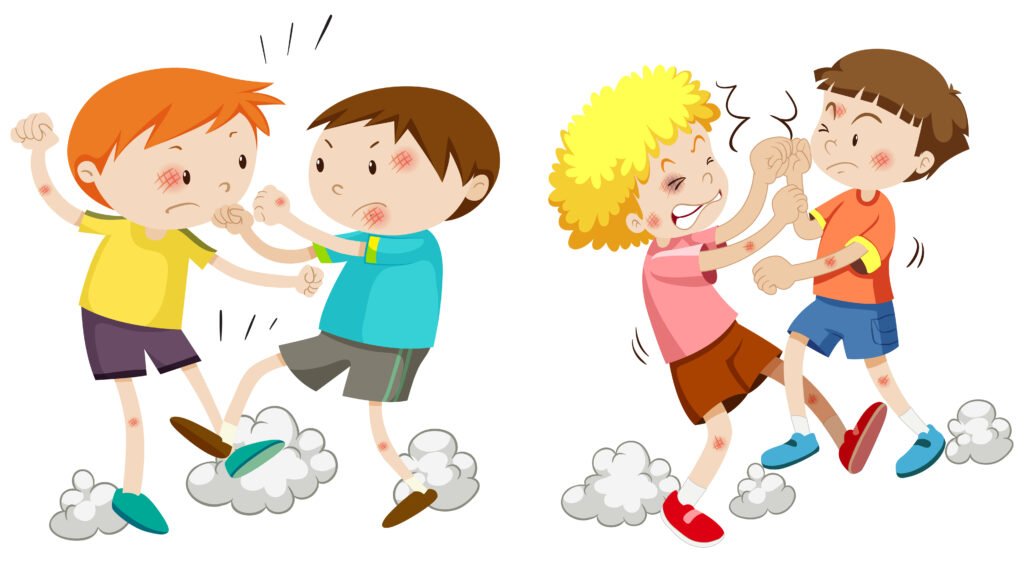Sibling rivalry is a common phenomenon in families with more than one child. It refers to the competition, jealousy, and conflicts that often arise between siblings as they vie for attention, resources, and parental approval. While some degree of sibling rivalry is normal and even healthy, it can become problematic when it leads to constant conflict and tension within the family. In this blog post, we’ll explore the dynamics of sibling rivalry, its potential consequences, and practical strategies for fostering positive sibling relationships and promoting peaceful conflict resolution.
Sibling Rivalry – Healthy vs Unhealthy
Sibling rivalry is a natural part of growing up and often stems from factors such as competition for parental attention, jealousy over perceived favoritism, and differences in temperament and personality. While occasional disagreements and conflicts between siblings are to be expected, persistent and intense rivalry can have negative effects on children’s emotional well-being and family dynamics.
Healthy sibling rivalry can motivate children to excel, develop social skills, and learn important life lessons such as sharing, cooperation, and empathy. However, when sibling rivalry escalates into constant conflict and resentment, it can lead to long-term damage to sibling relationships and disrupt family harmony.
Recognizing the signs of unhealthy sibling rivalry is crucial for addressing the issue early and preventing it from escalating further. By understanding the underlying causes of sibling rivalry and distinguishing between normal sibling disagreements and unhealthy rivalry, parents can take proactive steps to promote positive sibling relationships and foster peaceful conflict resolution.
Consequences of Sibling Rivalry

Sibling rivalry can have significant consequences for children’s emotional well-being, family dynamics, and long-term relationships. The constant competition, jealousy, and conflict between siblings can create a negative atmosphere within the household, leading to increased stress and anxiety for all family members.
Children who experience intense sibling rivalry may struggle with low self-esteem, feelings of inadequacy, and resentment towards their siblings. They may develop negative coping mechanisms such as aggression, withdrawal, or seeking attention through negative behavior.
In addition to its impact on children’s emotional well-being, sibling rivalry can also damage sibling relationships and strain family dynamics. Constant conflict and tension between siblings can erode trust, communication, and empathy, making it difficult for siblings to form strong bonds and support each other emotionally.
Furthermore, unresolved sibling rivalry can have long-term consequences for children’s relationships and mental health in adulthood. Siblings who grow up in an environment characterized by constant competition and conflict may struggle to form healthy relationships with others and may carry unresolved resentment towards their siblings into adulthood.
Building Positive Sibling Relationships
Fostering positive sibling relationships is essential for preventing and managing sibling rivalry. By promoting empathy, cooperation, and teamwork among siblings, parents can help children develop strong bonds and navigate conflicts constructively.
Encouraging siblings to spend quality time together, engage in shared activities, and celebrate each other’s achievements can help strengthen their relationship and foster a sense of camaraderie. Parents can also model positive sibling interactions by demonstrating empathy, fairness, and respect in their own relationships with their children.
Creating a supportive and inclusive family environment is another key factor in building positive sibling relationships. By establishing family traditions, rituals, and routines that involve all family members, parents can foster a sense of belonging and unity among siblings and promote a culture of cooperation and collaboration within the family.
Effective Communication Strategies
Effective communication is essential for resolving conflicts and promoting positive sibling relationships. Teaching children constructive communication skills, such as active listening, expressing feelings, and using “I” statements, can help them communicate their needs and resolve conflicts peacefully.
Encouraging siblings to listen to each other’s perspectives and validate each other’s feelings fosters empathy and understanding. By teaching children to express themselves assertively yet respectfully, parents empower them to communicate their thoughts and feelings without resorting to aggression or hostility.
Using positive language and avoiding blame or criticism during conflicts can help de-escalate tensions and promote cooperation. Encouraging siblings to use “I” statements, such as “I feel upset when you take my toys without asking,” can help them express their feelings without placing blame on each other.
Conflict Resolution Techniques
Teaching children problem-solving skills and conflict resolution techniques equips them with the tools they need to resolve conflicts peacefully and find mutually acceptable solutions. Encouraging siblings to work together to brainstorm solutions, compromise, and negotiate can help them develop important social and emotional skills.
Parents can model conflict resolution techniques by guiding siblings through the process of resolving conflicts and offering support and guidance as needed. Encouraging siblings to take turns speaking, listen to each other’s perspectives, and collaborate on finding solutions promotes teamwork and cooperation.
Implementing conflict resolution strategies, such as taking a break, using a calm-down space, or seeking help from a trusted adult, can also be effective in diffusing tense situations and preventing conflicts from escalating further. Teaching children when and how to take a break from a conflict can help them regulate their emotions and approach the situation with a clearer perspective.
Setting Clear Boundaries and Expectations
Establishing clear boundaries and expectations for behavior helps prevent conflicts and promote positive sibling relationships. By setting family rules and guidelines for behavior, parents provide children with structure and consistency, reducing opportunities for conflict and confusion.
Clearly defining consequences for violating rules or engaging in aggressive behavior helps reinforce boundaries and encourages children to take responsibility for their actions. Consistently enforcing consequences for breaking rules sends a clear message that certain behaviors are not acceptable and helps children understand the importance of respecting boundaries and expectations.
Encouraging siblings to work together to create their own set of rules and guidelines for behavior promotes ownership and accountability and encourages cooperation and collaboration. By involving siblings in the process of setting boundaries and expectations, parents empower them to take an active role in creating a positive family environment.
Encouraging Individuality and Celebrating Differences
Recognizing and celebrating each child’s unique strengths and talents is essential for promoting positive sibling relationships and fostering a sense of self-worth and acceptance. Encourage siblings to appreciate and value each other’s differences, recognizing that everyone has their own strengths and weaknesses.
Encourage siblings to support and uplift each other, rather than competing or comparing themselves to one another. Emphasize the importance of cooperation and collaboration, highlighting how working together towards common goals can benefit everyone involved.
By encouraging individuality and celebrating differences, parents can help siblings develop a sense of identity and self-confidence, while also fostering a strong sense of camaraderie and mutual respect within the family.
Modeling Positive Conflict Resolution
Setting a positive example by resolving conflicts peacefully is one of the most effective ways for parents to teach their children valuable conflict resolution skills. Demonstrate effective communication and problem-solving skills by actively listening to each other’s perspectives, expressing your own feelings assertively yet respectfully, and working together to find mutually acceptable solutions.
Show children how to apologize and forgive by admitting when you’ve made a mistake, taking responsibility for your actions, and offering sincere apologies when needed. Emphasize the importance of forgiveness and letting go of grudges, highlighting how holding onto resentment only perpetuates conflict and negativity.
By modeling positive conflict resolution techniques in your own relationships and interactions with your children, you provide them with a powerful example to emulate and reinforce the importance of constructive communication and empathy in resolving conflicts.
Seeking Professional Help When Needed
Knowing when to seek support from a family therapist or counselor is important for addressing sibling rivalry that may be escalating into more serious issues. If sibling rivalry is causing significant distress or impacting family dynamics, don’t hesitate to reach out to a professional for guidance and support.
Identify signs that sibling rivalry may be escalating into more serious issues, such as persistent aggression, extreme jealousy, or emotional withdrawal. Trust your instincts as a parent and seek help if you feel that your efforts to manage sibling rivalry are not effective or if you’re concerned about your children’s well-being.
Accessing resources and support networks for managing sibling rivalry can provide valuable tools and strategies for promoting positive sibling relationships and resolving conflicts peacefully. Don’t hesitate to reach out to other parents, online forums, or community organizations for advice and support.
Conclusion
Managing sibling rivalry requires patience, consistency, and a commitment to promoting positive sibling relationships. By implementing practical strategies for fostering empathy, cooperation, and effective communication skills, parents can create a harmonious family environment where children feel supported, valued, and loved.
Encouraging individuality, modeling positive conflict resolution, and knowing when to seek professional help are essential components of managing sibling rivalry effectively. By fostering a supportive and inclusive family environment, parents can help their children develop the skills they need to navigate conflicts peacefully and build strong, lasting relationships with their siblings.
In conclusion, by implementing these strategies and fostering a supportive family environment, parents can create a harmonious home where siblings feel respected, valued, and supported, ultimately fostering positive sibling relationships that will last a lifetime.









